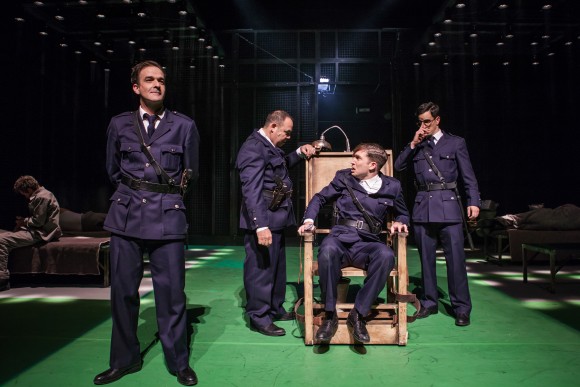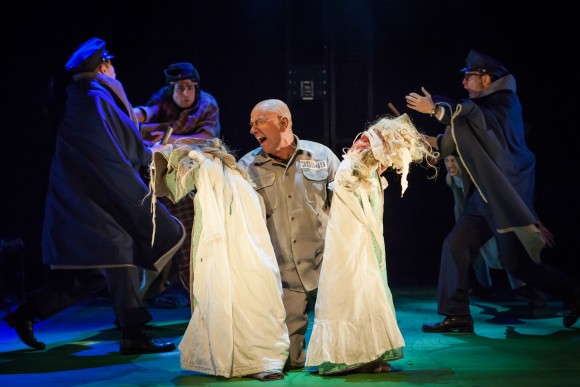
Beer Sheva Theatre’s production of The Green Mile is an emotionally moving and thought provoking experience. Director Irad Rubinstain is adept at distilling the essence of Stephen King’s novel to create a work of theatre that employs all its elements – dialogue, character, movement, set, lighting, music and costumes. It’s real magic of the theatre, no tricks, and this talented director has done it again (Romeo and Juliet – Beer Sheva Theatre; Mr. Vertigo – Gesher Theatre). Adapting a novel to the stage involves much more than converting story to dialogue. The endeavor of the novel is different; it usually aims to provide a more reflective perspective – the long view. Theatre, on the other hand, usually aims to get you where you live, and that is just what The Green Mile accomplishes. One emerges from the play in the grip of strong feelings, the thoughts come later on.
The Green Mile is set in Louisiana of the 1930s, death row at the State Penitentiary. One is instantly plunged into this grim empire of hopelessness, where, as Supervisor Paul Edgecomb (Amir Krief) says, there is “one mile between you and death.” On the surface, it would appear a difficult theme to explore, delving into the daily minutiae of a reality no one really wants to think about: the death sentence and execution by electric chair. Moreover, The Green Mile was not only a best-selling serial novel by Stephen King, it was made into a very successful film starring Tom Hanks. Given the setting, one knows what is going to happen, people will be put to death. Given the popularity of the novel and film, many people know exactly what is going to happen, so there’s a lot at risk here. Yet Rubinstain and the excellent cast had me on the edge of my seat, so fully immersed in the drama as it unfolded.
The staging of the play reflects the duality of the novel, describing the harsh reality of life on death row, and at the same time, telling a tale of the supernatural. From the beginning, one is repeatedly confronted by the electric chair itself, the undeniable presence of death as enacted by the law and its representatives on the individual. The prison is represented by a tall metal cage that surrounds the stage on three sides, so that looking forward one sees this enclosure, and in some sense, one is within it. Yet the bars of the individual cells are marked by light, a creative solution that is both practical and beautiful. The actors set up the prison scene as Paul introduces the story, music and movement are employed at different junctures in the play, establishing a sense of theatrical storytelling that engages and yes – entertains the viewer, drawing one deeper into the drama. The music, with its country western style, provides relief from the oppressive themes of the play, and another way to explore them. Johnny Cash’s cover of Nick Cave’s The Mercy Seat allows other voices to enter this dialogue, through the music.
The play immerses the audience in the daily lives of prisoners and guards, and the complexity of their relationships. Paul provides one focal point as the supervisor who clings to the letter of the law, pedantic about maintaining the prisoner’s rights and dignity in the hope that following the rules is a way of compensating for the horror of putting someone to death. Amir Krief is an actor who embodies his roles fully, and does so here. Paul invites one’s empathy from the start, a careful man who is doing his best with an impossibly tough job, trying to remain human in the most inhuman of places. When rehearsing an execution to make sure that protocol is followed to perfection, and Toot-toot, the stand-in for the prisoner, hams it up (a very funny Nitzan Rotschild), Paul is furious at his antics. It is this kind of macabre humor that develops in difficult situations and allows people to function, yet this humor is double-edged. It helps people survive the horror, enabling them to act, yet it keeps their feelings insulated from truly comprehending and feeling the horror of those actions. Perhaps there are some situations in which it should be impossible to carry out orders. Krief reveals the struggles of a man who is constantly living out a dilemma, trying to lead a moral life in an immoral situation.
The ensemble cast is excellent, from the kind guard ‘Brutal'(Nir Menki) who describes a micro-fantasy for a prisoner about to be executed, to the sadistic Percy, portrayed with eerie perversity and precision by Amit Epstein. Icho Avital gives a touching performance as Del, the inmate who keeps a pet mouse, Tom Graziani was wonderfully wild and revolting as ‘Wild Bill’ Wharton, and Ora Meirson illuminated the small role of Melinda with grace. Yet the fulcrum on which this tale turns is John Coffey, and Offer Zohar gives this character an innocence and quiet dignity strong enough to make one believe in magic, if only for an hour or two. It is so difficult to portray a person of limited mental capacity with veracity, and Zohar (whom nature blessed with the stature to pull off this role) uses the intonation of his voice and pace of speech in such a restrained and accurate manner that it is entirely credible. The simplicity and timidity of his demeanor, and the horror of his crime are difficult to reconcile.

Rubinstain lets this drama build slowly through the events of the days and the interactions between people, as one becomes acquainted with the characters and learns to care about them, or fear them. Suspense builds in a slow simmer, and the dramatic events shock and stun, yet most powerful of all is the desire for truth, hope, beauty, and goodness, a desire that lets us believe in magic.
Adapted from the novel by Stephen King; Written and directed by Irad Rubinstain; Set design: Svetlana Breger; Costumes: Oren Dar; Lighting: Ziv Voloshin; Music: Roy Yarkoni; Choreography: Amit Zamir; Fight coordinator: Uri Bustan; Cast: Eduard ‘Del’ Delacroix – Icho Avital, Percy Wetmore – Amit Epstein, Dean Stanton – Eliran Harush/Erez Kantor, John Coffey – Offer Zohar, ‘Wild Bill’ Wharton – Tom Hagy/Tom Graziani, Arlen Bitterbuck – Oren Cohen/Yirmi Reich, Jan Edgecomb – Tamar Levin, Melinda Moores – Ora Meirson, Brutus ‘Brutal’ Howell – Nir Menki, Guard/Doctor – Yarin Savion, Hal Moores – Jonathan Cherchie, Paul Edgecomb – Amir Krief, Toot-Toot – Nitzan Rotschild.





